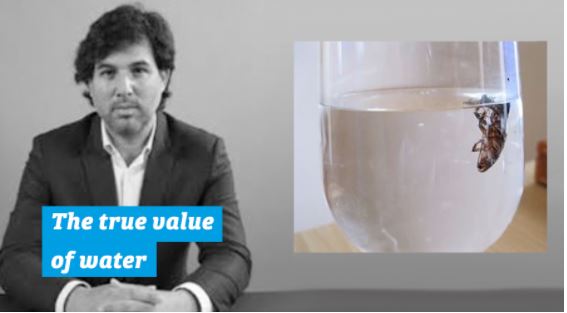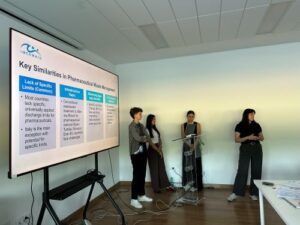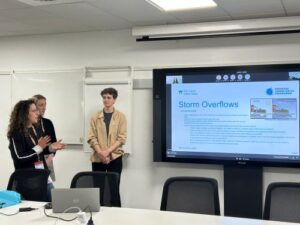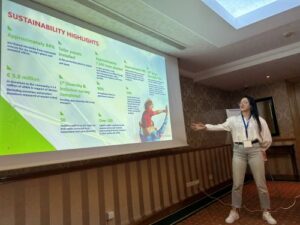Gonzalo Delacámara, PhD is a Senior Researcher Fellow on water economics with IMDEA Water in Spain, and an advisor to multilateral organizations including the European Commission, OECD, World Bank and selected UN organizations. Gonzalo is working with EJWP participants through his position as leader of the Vision Leadership Team on the Value of Water with Water Europe. He is heading up the masterclass and projects on the Value of Water with Groups 1 and 2 of EJWP.
Gonzalo agreed to share his views on the Value of Water in our lives and his experience interacting with EJWP:
Water Europe wanted to identify European leaders working on water issues for a more strategic approach about long term water security and to reach out wider audiences. I see my part with EJWP as an opportunity to draw on young professionals’ outlook towards a revised narrative on the value of water, and to see if it is practical to involve a wider range of values in adapting this narrative for one general purpose. Rather than leading them into a rigid framework, I wanted their view of thinking out of box on what water means to them. It was a great moment for me to step out of economic theory to experience it through their viewpoints.
Describe your interactions with EJWP participants in the Value of Water project/masterclass.
There was an initial masterclass on the need to master complexity for long term security in the context of climate adaptation. We’re in the middle of a shift from mitigating uncertainty to embracing how to best live with them. This led to the Value of Water exchange, and I explained in a masterclass that this is more than about value of water itself, but also how it can be connected to good story lines. The participants were really enthusiastic on thinking in this different way about water. It was beneficial to get their feedback, as I understand that it was quite complex to address the concept in a relevant framework. It’s about zooming in (to gain relevance and get closer to personal stories) and zooming out (to have the wider picture in mind) for stories that need to link to the larger discussion, while realizing that too much of either emotional or technical content can be counterproductive in delivering the message. There are ways to strike the balance in the tension between populism and technocracy.
What have you gained from this experience with EJWP?
It’s interesting to see where young professionals are coming from when we propose the idea of value of water. This discussion can actually be opaque as we economists can be somewhat indulgent thinking the topic is self-explanatory, but it’s multi-dimensional and far beyond economics. People tend to lean into their comfort zones when they go to emotional and cultural approaches to relating to water resources. I’ve worked with these participants to provide evidence that speaks for itself in a demonstrative context. It’s better showing than telling. Why is this so important? This is the only path to compelling narratives that lead to (voluntary) behavioural changes in the way people use, conserve and pollute water. We need to get more into the international forums with this narrative with a purpose. Without it, people may look around to the existing money and technology and see it as motivation to continue to make bad decisions about water.
The challenge is not really with the participants, who are well read and trained. I would like to think the program could be a vector to approach non-traditional water stakeholders, to get other voices into the conversation. These are people who may see themselves as stakeholders that are not part of the processes. I feel that nothing will really happen in terms of water security if we don’t address these people who are outside of the current conversation.
How do you see the added value from a client’s perspective in interacting with EJWP?
EJWP has many assets. I’m a true believer in cooperating within connected structures as part of a larger whole. This is in the DNA of programmes like EJWP. For example, in dealing with the Covid pandemic, it’s pathetic to think a global challenge can be tackled only with local solutions. In this framework, there’s a deficit in global water governance. EJWP-type programs are like an embryo to provide this larger governance and coordination. It needs to be people with a European identity strategizing on global challenges, with their varied perspectives on common issues, thinking of supranational, federal solutions. I may not have accepted to join in only a national program, with biased views about problems that are far from being strictly local, regional, or even national.
Why should the world care about the value of water?
What we’re doing here is relevant because not only is water significant in the policy implications of drought, flood, water quality, biodiversity and more – it’s about a means to an end and how water is connected to wider goals outside of policy objectives. Our water narrative needs to connect with social and economic development objectives: social cohesion, equity, macroeconomic performance, public health, food and energy security, climate change adaptation, spatial development…
What are other takeaways from your experience with EJWP?
With EJWP, I’ve benefited from seeing more how people with technical backgrounds fit their perspectives into all of this. Our conversations have moved to a multidimensional approach to water, beyond an environmental issue.
EJWP is still growing, even without an institutional base yet, and is heading towards its third group of participants. Water Europe can be an amplifier to help upscale the initiative, and I hope to see continued interaction with EJWP and Water Europe. Mentoring is really needed with young professionals. Going beyond merely providing instructions to have continuous support and guidance in all career phases is important.
Interview by Matt Luna






